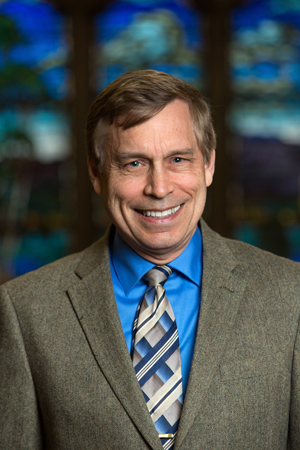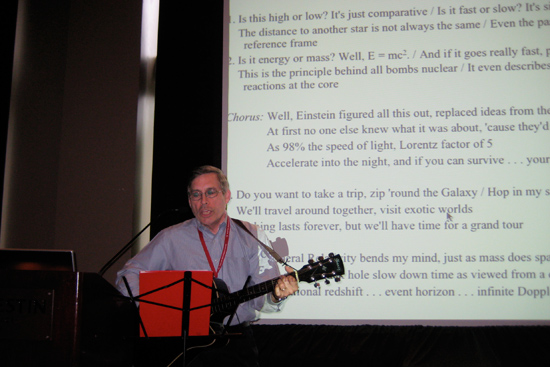Metcalf Award Goes to Alan Marscher
CAS astrophysicist introduces nonscience majors to the cosmos

Alan Marscher can tell you the moment that he became enamored with astronomy. He was 10, and his older brother, who had a telescope, mentioned that there would be an eclipse of the moon that evening. “We got up at two o’clock in the morning to watch,” Marscher recalls. “From that moment, I was in love with things that were happening out in the cosmos that we could actually observe.” Marscher, who had a paper route at the time, saved up to buy a better telescope.
He dreamed of becoming an astronomer, but didn’t think it would happen. “You read about history and these astronomers were either rich or were subsidized by a rich person,” says Marscher, a College of Arts & Sciences professor of astronomy and director of BU’s Institute for Astrophysical Research. He enrolled at Cornell as an engineering major, but in an astrophysics class sophomore year, he says, “it was like I was home. I enjoyed working out problems in physics combined with the wonder of the cosmos. I just fell in love with it.”
Marscher’s passion for astronomy and for teaching have earned him one of the University’s highest teaching honors, a Metcalf Award for Excellence in Teaching, which he will receive on Sunday at BU’s 141st Commencement.
After earning a master’s and a PhD from the University of Virginia, Marscher worked at NASA’s Goddard Space Flight Center. In 1981 he arrived at BU, where he has held several positions: chair of the astronomy department, associate dean of CAS, and director of BU’s Center for Excellence & Innovation in Teaching. He has as well conducted groundbreaking research into high-energy astrophysics and the nature of extragalactic phenomena, including black holes.
Marscher is perhaps best known for the passion and dedication he brings to his popular undergraduate Core Curriculum Natural Sciences I and Cosmology courses, both for nonscience majors. Unlike many who prefer to teach upperclassmen and graduate students in specialized seminars, Marscher loves teaching in the Core Curriculum, he says. He wrote the textbooks used in both classes, which he makes available free to his students as e-books.
“The students who are taking the science part of the Core are in their first year, so they’re just entering college and most never studied the cosmos before,” he says. “These are fresh minds and as a teacher, I’m able to instill in them a wonder of the cosmos and a wonder in the fact that we can explain so much of it despite these phenomena occurring so far away.”
He found that it also broadened his own perspective. “When I started teaching in the Core, I had only been teaching physics and astronomy courses, and I had quite a narrow view of what we were doing and what we were studying in nature,” Marscher says. “My colleagues in the humanities and the other sciences teaching the Core had a much broader perspective.” Where he once studied a star for a star’s sake, he soon found himself considering other aspects. “I just broadened my mind and then it became a passion for me to get students to see things in a broader perspective as well.”
In a letter nominating Marscher, one of his students, Jeffrey Volpintesta (CAS’15) described his “soaring passion for astronomy that incites in his students the sparks of curiosity which make amateur astronomers and cosmologists of the entire lecture hall.…Professor Marscher engages the minds of his students and expands not simply their worldview, but how they look at themselves, the night sky, and the entire universe.”
That, says Marscher, is the whole point of both his courses. He knows that most of his students may never take another science course. “What we want to do is prepare them to be citizens who appreciate science and can follow along as scientists make more progress understanding nature,” he says. His goal is to ensure that students learn enough about the cosmos and “what science has figured out about the universe” that they’ll have “the interest and ability to read articles about scientific discoveries in the future” and be able to put them in context.

Ask any of his students about Marscher’s classes, and the word you’ll hear most often is “demanding.” “You need to keep probing students’ understanding, so you need to get them to respond, and one of the best ways is to keep asking them questions, keep trying to get them to think and apply what they’re learning,” says Marscher, a master of the Socratic method. “If they don’t apply what they’re learning to new situations, then they’ll be limited in their real understanding of it.” So he has students take part in creative activities. In one discussion on relativity, they are asked to plan space travel near the speed of light: how fast they want to go, what problems they might encounter, and how they might overcome them. “In that way,” he says, “I think that the students can conceptualize better the concepts that we’re trying to teach them.”
“The entire class is forced to challenge what they believe, not necessarily in order to change it, but rather to examine it,” wrote one student.
Marscher, a guitarist who played in garage bands during high school and describes his voice as “above mediocre,” famously incorporates rock music in the curriculum. He started performing songs like Queen’s “Thirty Nine”—which explores relativistic travel—for his students. “The response,” he recalls, “was so overwhelmingly positive that I decided well, okay, I’ll start writing some of my own songs.” So he began writing songs about science and soon found “that I could actually put quite a bit of the lesson into the song.” Among his dozen or so science-related titles are “Universal History,” a description of the Big Bang theory, “Relatively Weird,” addressing Einstein’s theories of special and general relativity, and “Universe Perverse,” which he describes as “a protest against determinism.”
Marscher’s role in shaping the way nonscience majors approach scientific inquiry may best be summed up by Volpintesta who wrote: “Professor Marscher invites students to probe the universe for themselves, to look up at the stars and wonder, and to yearn for new scientific research and information that might explain just a little more of the mystery that is the universe.”
A gift from the late Arthur G. B. Metcalf (SED’35, Hon.’74), a BU Board of Trustees chair emeritus and former professor, funds the Metcalf awards, created in 1973 and presented at Commencement. The Metcalf Cup and Prize winner receives $10,000 and the Metcalf Award winners receive $5,000 each. A University committee selects winners based on statements of nominees’ teaching philosophy, supporting letters from colleagues and students, and classroom observations of the nominees.
This year’s Metcalf Cup and Prize winner is Stormy Attaway, a College of Engineering assistant professor of mechanical engineering. The second Metcalf Award winner is trumpeter Terry Everson, a College of Fine Arts associate professor.
Listen to Alan Marscher’s science-themed songs here.
More information about Commencement can be found on the Commencement website.
Comments & Discussion
Boston University moderates comments to facilitate an informed, substantive, civil conversation. Abusive, profane, self-promotional, misleading, incoherent or off-topic comments will be rejected. Moderators are staffed during regular business hours (EST) and can only accept comments written in English. Statistics or facts must include a citation or a link to the citation.